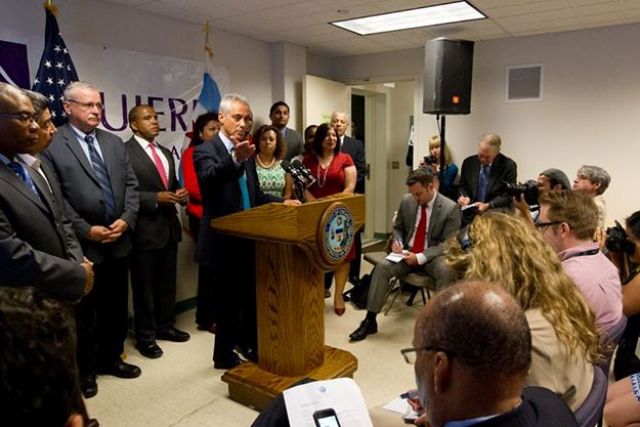Mayor's Task Force Recommends $13 Minimum Wage
By aaroncynic in News on Jul 8, 2014 9:00PM

Photo credit: City of Chicago/Brooke Collins
Mayor Rahm Emanuel’s Minimum Wage Working Group made its recommendation Monday to raise the minimum wage in the city to $13 an hour by 2018. The task force, comprised of 18 city legislators and labor leaders, said that an increase to that amount would mean higher wages for more than 400,000 workers and an additional $800 million into the local economy.
Emanuel spokeswomen Kelley Quinn said in a statement:
“Mayor Emanuel met with the Working Group at their final meeting this afternoon and was impressed by the thoroughness of their work. He fully supports the group’s balanced proposal.”
Raising the minimum wage has been a hot issue both locally and nationally, with everyone from Illinois Gov. Quinn to labor unions and community organizers calling for an increase from the current $8.25 state minimum to anywhere between $10 and $15 an hour. The current federal minimum wage is $7.25.
Under the panel's recommendation the minimum wage would rise from $8.25 to $9.50 an hour next year, followed by several incremental increases until it hits $13 an hour by 2018. After that, minimum wage increases would be tied to the rate of inflation. According to the Chicago Tribune, employees surviving mainly on tips would also see their wages go up $1.00 to $5.95 by 2015. Total pay (wages plus tips) would have to equal the amount non-tipped employees are paid.
The working group’s proposal isn’t without its critics however, both by supporters of an increase in the minimum wage and business leaders who want wages to stay where they are. Rob Karr, president of the Retail Merchants Association, said any increase to the minimum wage would “make it difficult for Chicago retailers to remain competitive and hire.” Sam Toia, President of the Illinois Restaurant Association, took a slightly more nuanced approach, saying that it would support a statewide increase, rather than a “piecemeal approach proposed by each municipality.”
Voters in Illinois will be asked on the ballot this November in a non-binding advisory referendum if the state’s minimum wage should be raised to $10 an hour—a measure Gov. Quinn supports.
Raise Chicago, a grassroots campaign working to raise the minimum wage, said that while Mayor’s Minimum Wage Working Group “took a first good step,” the proposal ultimately isn’t enough. According to a statement from the organization:
“The proposed four year phase-in period means that the poorest workers will only see small increases that barely impact their ability to meet expenses. A $13 minimum wage in 2018 would only be 9 cents above the federal poverty line, which would keep Chicagoans entrenched in a cycle of violence and poverty.”
The Workers Organizing Committee of Chicago, the group behind the Fight For 15 campaign which has staged numerous strikes throughout the city helped bolster movements for a $15 an hour minimum wage nationwide, also said it would continue pushing for that amount. “Any recommendation that is less than $15 is an insult to the hundreds of fast food workers that have risked their jobs and made sacrifices for the well-being of this city,” the group said in a statement.